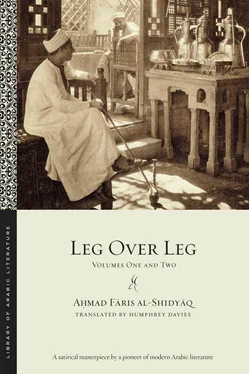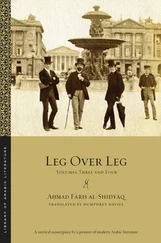150ʿAntar ibn Shaddād: a pre-Islamic poet whose life gave rise at a later date to a popular epic of chivalry.
151The name of the deity is used to express deep feeling incited by music or poetry.
152 Poetry’s Destiny , etc.: Lamartine’s essay is entitled Des destinées de la poésie and contains the words “je vois… des générations rajeunies… qui reconstruiront… cette oeuvre infinie que Dieu a donné à faire et à refaire sans cesse à l’homme, sa propre destinée. Dans cette oeuvre la poésie a sa place.” (Lamartine, Oeuvres 56).
153François-René de Chateaubriand (1768–1848): writer, politician, diplomat, and historian, considered the founder of Romanticism in French literature, who lived in America from 1791 to 1792. The originals of the two passages quoted below are to be found at Chateaubriand, Oeuvres complètes de Chateaubriand , vol. 6, Voyages en Amérique, en Italie, au Mont Blanc: Mélanges littéraires (Paris: Garnier, [1861]), 54 and 62.
154When Bilqīs, Queen of Sheba, visited Sulaymān from her kingdom in Yemen, he had a splendid pavilion built for her reception (Q Naml 27:44).
155The verses are by Hammām ibn al-Salūlī (d. 100/718).
156“a Magian”: a Zoroastrian, and thus supposedly a worshipper of fire.
157“pursies, and other things that have similar-sounding names” ( li-l-akyās wa-li-mā jāʾa ʿalā waznihā wa-rawiyyihā ): literally, “purses, and things that have the same syllabic structure and rhyme-letter”; the author probably intends the Arabic reader to think of aksās (“cunts”), just as the translator hopes the English reader will think of “pussies.”
158Mount Raḍwā: a mountain in Medina.
159“Words… Matter… Form”: the terminology is Aristotelian and was adopted by Muslim philosophers writing on physics, psychology, and metaphysics, with “Matter” meaning the substratum from which any entity is formed (thus, the soul is the matter from which the body is formed, wood the matter from which the chair is formed). The application of this analogy to the relationship between speech and meaning may be original to the author, whose intention seems to be to give a twist to the widely accepted notion that man is superior to other beings by virtue of having the capacity to speak, his point being that, if you have little to say, any such superiority is moot.
160Abū Dulāmah: buffoon poet to the first three Abbasid caliphs (d. 161/777–78).
161“al-Kuʿaykāt… al-Rukākāt”: comic names, meaning “Cookies” and “Simpletons” (or “Cuckolds”) and perhaps joking allusions to the village of al-Shuwayfāt (Choueifat) — which is next door to al-Ḥadath, where the author lived in his youth and which has long been a transit point for trade among Beirut, the south, and Mount Lebanon — and another location as yet unidentified.
162“ cap ital (and ass ets)” ( raʾs al-māl wa-dhanabuhu ): literally, “the head of the money ( raʾs al-māl ) and its tail,” the author playing with the literal meaning of the Arabic expression meaning “(financial) capital.”
163“faces radiant” ( wa-l-wujūhu nāḍirah ): cf. Q Qiyāmah 75:22 wujūhun yawmaʾidhin nāḍirah “Some faces will be radiant on that Day.”
164“those lands” ( tilka l-bilād ): i.e., Lebanon, or Mount Lebanon.
165“every judge” ( kullu qāḍin ): or “each party to the transaction.”
166“her c…” ( mabā …): the missing Arabic word is mabālahā .
167Diʿbil: Diʿbil ibn ʿAlī al-Khuzāʿī (148–246/765–860), a poet of invective ( hijāʾ ) and philologist who lived in Kufa.
168“‘O feeder of the orphans’… etc.” ( a-muṭʿimata l-aytāmi ilā ākhirihi ): a reference to the widely cited but unattributed verse a-muṭʿimata l-aytāmi min kaddi farjihā * a-lā lā taznī wa-lā tataṣaddaqī (“O you who feed the orphans from the labor of your vagina, * I say to you, [better that] you neither fornicate nor give alms!”), i.e., it is better to do nothing than to seek to do good through illicit means.
169“Unseemly Conversations and Crooked Contestations” ( Muḥāwarāt khāniyah wa-munāqashāt ḥāniyah ): alternatively, Muḥāwarāt khāniyyah wa-munāqashāt ḥāniyyah (“Inn-style Conversations and Tavern-style Discussions”).
170“which is why it’s called qahwah ”: the author links qahwah (“wine”) to the verb aqhā (ʿan al-ṭaʿām) , “to be put off (one’s food),” though the roots are different.
171Daʿd, Laylā: women’s names.
172“his ankleted honies”: i.e., the women of his household.
173“Each day some new matter he uncovers” ( fa-huwa kulla yawmin fī shān ): Q Raḥmān 55:29.
174“the two best things” ( al-aṭyabayn ): i.e., eating and coitus.
175Al-Qāsim ibn ʿAlī al-Ḥarīrī (446–516/1052–1122), Iraqi prose writer, poet, and official, wrote fifty immensely popular maqāmāt , which he compiled into a work of the same name.
176“the Nawābigh ”: Al-Kalim al-nawābigh , a brief homily written in a mannered, ornamental style.
177“his grandfather” ( jaddihi ): i.e., his mother’s father, Yūsuf Ziyādah Musʿad, of ʿAshqūt (al-Maṭwī, Aḥmad 1:49), his father’s father, Manṣūr, having died in 1793.
178“ she … degree … awry … eye ”: despite his protestations, the author slips into rhymed prose at this moment of heightened emotion, possibly without noticing, and continues to do so at similar moments throughout the chapter.
179“she had an eye that was ‘dried up’” ( dhābilatuhu ): meaning, presumably, that her eye had lost its moistness by having taken on that “sleepiness” that is said to characterize “bedroom” eyes.
180“the whole entry… too noble to speak of”: the entry for the root ḥ-sh-f includes words meaning “it (a camel’s udder) became contracted and withered” and “dry bread” and “the worst quality of dates,” as well as ḥashafah , “the head of the penis.”
181“such a contrast…”: ṭibāq (“antithesis”), consisting of the “inclusion of two contraries in one line or sentence” (Meisami and Starkey, Encyclopedia , 2:659), is a rhetorical staple of traditional Arabic poetics.
182“or I do on their behalf”: by implying that he wrote the lines himself, the author may be seeking to undermine the sometimes spurious authority lent to ideas stated in prose by topping them off with a couple of lines of verse, a standard technique used by writers of earlier generations.
183Both are labial consonants.
184“for a boy I teach”: the author refers to the practice of addressing the beloved as though she were a male ( tadhkīr ), a feature of Arabic poetry and song from the earliest times until today.
185The author deploys two contradictory arguments: that tadhkīr is used because some “men who can see no good in women” prefer to do so, and that it reflects an underlying grammatically masculine referent, namely the word shakhṣ ; thus, according to the second argument, when the poet refers to “he” or “him,” he really means “that person” and is thinking of a female. The French and Italian equivalents of shakhṣ that the author has in mind are, presumably, personne and persona .
186“Ibn Mālik’s Sharḥ al-Mashāriq ”: the author’s name as given by al-Shidyāq is apparently a mistake for (ʿAbd al-Laṭīf ibn Firishtah ʿIzz al-Dīn ibn Amīn al-Dīn) Ibn Malak (d. after 824/1421), whose Mabāriq al-azhār (fī) sharḥ Mashāriq al-anwār , a hadith collection with extended commentary, was regarded as a classic and reprinted several times in the nineteenth century ( Encyclopaedia of Islam , edited by P. J. Bearman, Th. Bianquis, C. E. Bosworth, E. van Donzel, and W. P. Heinrichs et al., 2nd ed., 12 vols. (Leiden: E. J. Brill, 1960–2005), 2:923–24); it has, however, proven impossible to confirm the reference in the absence of any mention of the hadith from the commentary on which this passage is presumably taken.
Читать дальше












